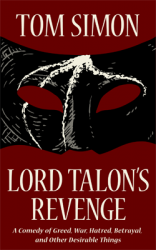A man with no name, no country, no face, has one simple desire: revenge on the tyrant who robbed him of all else. Just a few small obstacles stand in his way. . . .
Greed: Sagrendus the Golden, Prince of Dragons, has a good business: abduct princess, collect ransom, repeat until rich. He charges extra for taking sides.
War: General Griffin, ogre mercenary, always fights for his client — even if there is nobody to fight against.
Hatred: Princess Jacinth hates the man she will have to marry — whoever he is. She also hates kings, rescuers, men, women, and especially porcelain dolls.
Betrayal: What keeps King Talvos on the throne of Ilberion? He’s better at double-crossing than anyone who double-crosses him.
And then there is one young fool with a sword, who still believes in heroes. Revenge is about to get a lot more complicated.









Recent Comments